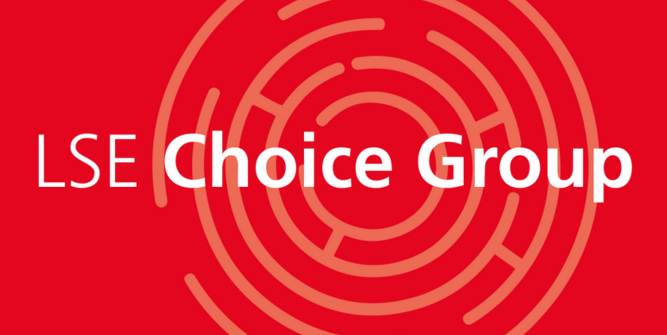Event Categories: BSPS Choice Group Conjectures and Refutations Popper Seminar Sigma Club

- This event has passed.
Choice Group Seminar PhD edition
9 October 2024, 4:30 pm – 6:00 pm
Event Navigation

Kangyu Wang (LSE) & Paul Forrester (Yale): ‘Investment returns, risk appetites, luck egalitarianism, and the put seller of the last resort’
Abstract: Financial markets serve the rich far better than the poor. A common view is that since investors voluntarily make their choices, they cannot complain about the results. In philosophical terms (Dworkin 1981, 2011), the divergence of returns comes from option luck and is thus, according to many, unobjectionable. This view is wrong. Distributive justice theory has in general overlooked the importance of risk appetites. To gain excess returns is to take risks. Less risk-averse investors are expected to gain higher returns in the long run. Thus, even when the ex-ante expected utilities of investors of different risk appetites are the same, their expected ex-post utilities are different. Risk appetites are to a huge degree matters of brute luck. Therefore, the abovementioned divergence is objectionable even in Dworkin’s terms. Moreover, since productive financial assets (most importantly, equities) are riskier than other major assets (most importantly, bonds), there can be a downward spiral which has been seen in, for instance, the UK: the poorer ordinary households are, the less risk they can take, the more they underweight equities, the worse the economy performs, the poorer they will be. However, straightforwardly redistributive measures risk undermining market efficiency and discouraging adventurous investments. Considering the advantages and limits of existing models like Singapore’s Temasek and New Zealand Superannuation Fund, we propose a mechanism in which the state as the “put seller of the last resort” absorbs downside volatility for ordinary households. Unrecognised by previous studies (Otsuka 2023), such a scheme can promote egalitarian values even without being straightforwardly redistributive.
Kangyu Wang is a PhD candidate at the LSE. Paul Forrester is a PhD Candidate at Yale.
Andrea Petrou (LSE): A ‘money pump’ argument against foreseen preference change
Abstract: Work on diachronic rationality usually focuses on the rationality of beliefs or credences as they change over time. However, not much is dedicated, to the rationality of changing preferences or utilities over time. ‘Money pump’ arguments aim to show that a set of preferences is irrational by constructing a scenario where a book keeper is able to exploit an agent through a series of offers without knowing anything more than what the agent knows and where the agent, at every step, chooses completely rationally by their own lights. The exploitability of the agent is meant to imply her irrationality in such a case. I argue that such a ‘money pump’ argument exists for the irrationality of acting upon foreseen changes in one’s preferences. Intuitively, this is because one’s preferences will fail to cohere over time if they change. This is troubling given how commonplace and seemingly innocuous changes of preference are. I survey various avenues for addressing this problem.
Andrea Petrou is a PhD candidate at the LSE.
Sign up for more information about this event.
This event will take place in person on LSE’s campus. However, those unable to attend in person will have the option of taking part online.
To join online just follow these instructions:
- Download Zoom
- Zoom link for this for this meeting: https://lse.zoom.us/j/6613924533
Please note that these events are routinely recorded, with the edited footage being made publicly available on our website and YouTube channel. We will only record the audio, the slides and the speaker and will not include the Q&A section. However, any question asked during the talk itself will feature in the final edit.

